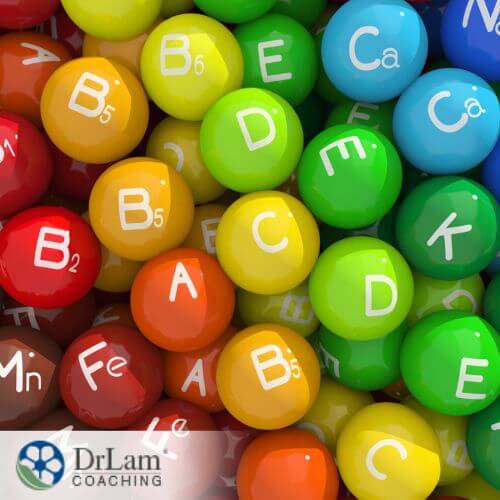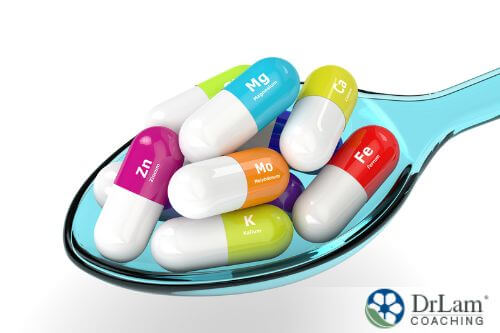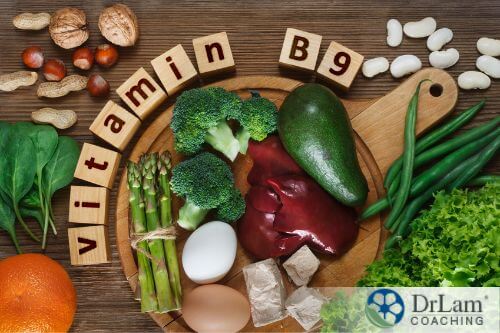 Many Americans do not get the recommended amounts of essential vitamins that their bodies need to stay healthy. Why? There are many reasons. The stress of a fast-paced lifestyle, for example, may keep people from having the energy to cook healthy meals. It's hard to know which foods have the nutrients you need and then find appetizing ways to prepare them. The result is an increase in various disorders in the US population that include diabetes, heart disease, irritable bowel disease, obesity, and many others. Many of these health issues are associated with an increase in inflammation.
Many Americans do not get the recommended amounts of essential vitamins that their bodies need to stay healthy. Why? There are many reasons. The stress of a fast-paced lifestyle, for example, may keep people from having the energy to cook healthy meals. It's hard to know which foods have the nutrients you need and then find appetizing ways to prepare them. The result is an increase in various disorders in the US population that include diabetes, heart disease, irritable bowel disease, obesity, and many others. Many of these health issues are associated with an increase in inflammation.
Although you may find it hard to believe, inflammation is a good thing. It tells you that your immune system is responding to a stressor. This stressor could result from a physical injury, a viral infection, or mental stress. But inflammation usually goes away once whatever caused it is dealt with.
Chronic inflammation, on the other hand, points at a larger problem. And what is worse, we often do not even know our bodies are dealing with a problem until we begin to see symptoms.
But what causes this type of inflammation, and what are the possible symptoms?
Inflammation is your body’s response to stress. When stress of any kind strikes, you experience a marked increase in your cortisol levels, mostly from your adrenal glands. And this is good because cortisol serves to counteract inflammation. But when your adrenals become overtaxed, two things happen: they start producing less cortisol, and inflammation increases.
Your Inflammation Circuit is the system in your body that creates inflammation and an immune response to deal with a threat. It is part of your NeuroEndoMetabolic (NEM) stress response, your body's global way of handling stress. Besides your immune system, it closely works with your gut and your microbiome.
In order to maintain a proper balance, you need to preserve the health of your adrenals, your gut, and your microbiome. One of the most important ways of doing so is by ensuring your diet has all the essential minerals needed to keep all systems going optimally. Besides diet, you could also look at supplements to get these essential vitamins.
The aging process, unfortunately, often sees a decrease in your body’s ability to either manufacture or utilize many of these nutrients. So making sure you are getting enough of these essential vitamins becomes even more important as you age.
Your body needs a large variety of essential vitamins to function properly. You can get them from foods, ideally, or from supplements.
The different vitamins have different functions. They may play a role in proper blood activity, digestion, or the nervous system, among many other roles. Truly, they are critical for almost every part of your body.
 Of course, you shouldn't forget the role of minerals like potassium, calcium, iron, and magnesium. Shortages in these could also account for many symptoms associated with different health conditions. Fortunately, like essential vitamins, we can find the minerals our bodies need from the food we eat, assuming we follow a varied diet.
Of course, you shouldn't forget the role of minerals like potassium, calcium, iron, and magnesium. Shortages in these could also account for many symptoms associated with different health conditions. Fortunately, like essential vitamins, we can find the minerals our bodies need from the food we eat, assuming we follow a varied diet.
Vitamin A plays a role in cellular development and growth. It also promotes hair, skin, nail, bone, teeth, gum, and glandular health. The antioxidant function of this essential vitamin promotes heart, kidney, and lung health.
Good sources include fatty fish like salmon, eggs, and fresh fruit and vegetables such as carrots, spinach, sweet potatoes, squash, and mangoes.
The various B vitamins have many potential health benefits.
Vitamin B1, or thiamine, is involved in energy production. It helps you use carbohydrates as an energy source. Thiamine plays an important role in muscle, skin, and nerve health. It also promotes proper nerve and metabolic function.
The best sources of this essential vitamin include meat, especially fish, nuts, seeds, legumes, and whole grains.
Vitamin B2, or riboflavin, plays an important role in converting food into energy. It also plays a role in cellular function, metabolic processes, vision, and skin health, and provides adrenal support.
Good food choices include lean red meat such as organ meat like kidney or liver, poultry, mushrooms, leafy green vegetables like broccoli and kale, soy products, asparagus, and whole grains.
Vitamin B3, also called niacin, plays an important role in energy metabolization and cellular growth. This vitamin may also play a role in cholesterol management, according to literature.
Sources of this essential vitamin include lead red meat like beef, seafood, grains, legumes, nuts, and eggs.
Vitamin B5, pantothenic acid, helps to keep blood sugar levels stable and plays a role in the metabolization of energy. It is also commonly referred to as riboflavin. This essential acid, one of the easiest to come by from what you eat, is present in most foods.
Foods with a high vitamin B5 concentration, however, include poultry, seafood, lean beef, whole grains, chickpeas, avocadoes, potatoes, mushrooms, and chickpeas.
Vitamin B6, or pyridoxine, plays a role in protein and carbohydrate metabolism and energy release. It is important for red blood cell synthesis and proper nerve function. It also plays an important role in a fetus’ brain development.
Food sources include whole grains, leafy green vegetables, soybeans, bananas, lean red meat, poultry, and seafood.
Vitamin B7, or biotin, plays a role in the metabolization of fats from carbohydrates. It also helps in the conversion into energy. Furthermore, it plays a role in glucose synthesis. Low levels of this essential vitamin may contribute to the thinning of hair and skin issues.
You find this vitamin in whole grains, fish, eggs, nuts, seeds, leafy green vegetables, sweet potatoes, and bananas.
 Vitamin B9, also referred to as folate, is another of the essential vitamins playing a role in DNA and RNA production. It also has an important function regarding cell division. Pregnant women, especially, should consider a folate supplement or focus on foods high in this vitamin. This is because it helps prevent birth defects fetus.
Vitamin B9, also referred to as folate, is another of the essential vitamins playing a role in DNA and RNA production. It also has an important function regarding cell division. Pregnant women, especially, should consider a folate supplement or focus on foods high in this vitamin. This is because it helps prevent birth defects fetus.
Common food sources include liver, legumes, leafy green vegetables like spinach, avocado, citrus fruits, and asparagus.
Vitamin B12, or cobalamin, is essential for making DNA, RNA, and red blood cells. It also plays a role in nerve health due to its role in myelin production. Many vegans have a vitamin B12 deficiency because you find it in mainly animal products, including fish, beef, and poultry.
Vitamin C, or ascorbic acid, has strong antioxidant properties that help to fight free radicals. It supports immune health, wound healing, and is essential for proper iron absorption.
Besides various citrus fruits like oranges, lemons, or grapefruit, good vitamin C food choices include kiwi fruit, strawberries, peppers, melons, broccoli, potatoes, and tomatoes.
Vitamin D is one of the most essential vitamins to keep your body and mind in good health. A vitamin D deficiency, for example, is often associated with depression in northern climates with low light conditions in winter. Getting enough sunlight is one of the easiest ways of upping your vitamin D intake. This vitamin plays an important role in your body’s absorption of calcium and the regulation of your immune system.
Food choices high in vitamin D include fatty fish like salmon or herring, fish oils, soy products, milk products like butter, and eggs.
A fat-soluble antioxidant, vitamin E helps fight free radicals. It also plays a role in certain immune system functions, maintaining muscle mass, and red blood cell health.
Good food choices for vitamin E include nuts, seeds, whole grains, leafy greens like spinach and kale, vegetable oils like sunflower oil, and eggs.
Vitamin K helps with proper blood flow and plays a role in your blood’s clotting process.
Good food choices for this vitamin include liver, red meat, leafy greens like spinach, figs, blueberries, dairy products like cheese and Greek yogurt, and eggs.
Sometimes, too much of a good thing is a bad thing. Supplementing with certain essential vitamins can cause side effects. They can also interact with certain medications. For example, too much vitamin K can reduce the effectiveness of blood-thinning medications.
This is why it's important to talk to your healthcare practitioner before starting on any supplements. They can help you determine which essential vitamins to take and the best dosage.
Essential vitamins play an important role in your health, and hidden deficiencies can cause many health issues. The best source is always your diet, but supplements can help as well. It's key that you chose the right ones in the right dose for your body, though.
If you would like to know more about or need assistance with essential vitamins, the team at Dr. Lam Coaching can help. We offer a free* no-obligation phone consultation at +1-626-571-1234 where we will privately discuss any issues you may have. You can also send us a question through our Ask The Doctor system by clicking here.
A resounding YES! Essential vitamins help maintain just about all your body processes and systems. they also provide the adrenal support so many of us need. However, it is still important to talk to your healthcare professional before starting on any supplements.
